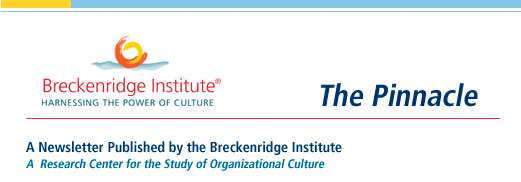Working within Global Boundaries Part 4
The forces, trends, and pace of the business environment have the single greatest influence on shaping organizational culture. But there are even more global forces affecting the business environment in subtle, yet profound ways. The Breckenridge Institute® has identified Four Global Boundary Conditions that will define the logical geography of the business environment for the next 50 to 100 years. In the September 2008 edition of the Pinnacle, we discussed the first global boundary condition: Advances in Science and Technology. The November 2008 Pinnacle featured the second global boundary condition: The Global Redistribution of Power and Wealth. The third global boundary condition, Competing Political, Cultural, and Religious Ideologies, was discussed in the January 2009 edition of the Pinnacle. This month we feature the final in this series – Sustainability of the Physical Environment.
The combined pressure exerted on our physical environment by the other three Global Boundary Conditions has raised serious questions about the earth’s ability to sustain the lifestyle of billions and billions of people. “While the goal of a sustainable society is a popular notion, “says Mark Bodnarczuk, Executive Director of the Breckenridge Institute, “it has been difficult to implement, especially when it impacts business and economic growth.” Some have tried to weave the theme of corporate responsibility and sustainable development into the fabric of the global business environment in the hopes of reducing the size of our “ecological footprint” on the earth. Others argue that the earth is the best teacher of sustainable practices, insisting that a more complete scientific understanding of nature's organizing principles can be applied to the design of a more sustainable, ecologically balanced society. Still others argue that we must mitigate the daily bombardment from the media to buy and consume products and services, and instead purchase only what we need from environmentally friendly sources. Some futurists argue that more rapid advances in science and technology hold the answer to sustainability. On this view, the modeling of carbon-based (human) intelligence in silicon-based computer systems, and our ability to manipulate biological and genomic processes are early precursors to our ability to break free of the earth as a life support system and develop alternative environments that do not require the earth’s ecological systems as we currently know them. “Regardless of the view adopted,” states Bodnarczuk, “the sustainability of the physical environment will continue to play a powerful role in shaping the business environment in which organizations interact.” Consciously creating a corporate culture that mitigates the negative affects of all four global boundary conditions is the key strategy for giving an organization long-term direction.
HBR Editor’s Blog
Every month, the senior editors of the Harvard Business Review (HBR) invite internationally recognized organizational theorists and practitioners to raise issues and answer questions about leadership and management issues on the HBR Editor’s Blog. This month, we provide Pinnacle readers with links to two important and interesting discussions (see below).
Gary Hamel, The Future of Management
Vineet Nayar, Green Leadership from an Unexpected Place
We encourage you to join the conversation on the HBR Editor’s Blog and voice your opinions, commentary, and insights on these and other important topics.
Update
| • |
Mark Bodnarczuk has just completed the second edition of his book, Diving In: Discovering Who You Are In the Second Half of Life. It will be available in book stores and on websites like Amazon.com world-wide in 4-6 weeks.
|
| • |
The Breckenridge Institute® has developed a key partnership with ShareOn which is an on-line corporate leader resource that links assessments and leadership investment strategies, with an extensive resource library designed to help leaders become more productive. ShareOn will be a distributor of the Breckenridge Type Indicator™ (BTI™) and the Majors PT-Elements™. For more information go to www.goshareon.com or contact Rachel at 651-270-7810 or Rachel@futuresystemsconsult.com. |
| • |
The Breckenridge Institute® has developed a key partnership with Type Resources Inc. one of America’s largest and most well-established providers of qualifying programs in the areas of personality and leadership development. Type Resources will be a distributor of the Breckenridge Type Indicator™ (BTI™) and the Majors PT-Elements™ and will be developing a qualifying program for the Majors PT-Elements™. For more information go to www.type-resources.com or contact them at 502-893-3677 or info@type-resources.com. |
| |
The Breckenridge Institute® has developed a key partnership with Career/LifeSkills Resources Inc. one of Canada’s largest and most well-established providers of qualifying programs in the areas of personality and leadership development. Career/LifeSkills will be a distributor of the Majors PT-Elements™ and will be developing a qualifying program for the Majors PT-Elements™. For more information go to www.career-lifeskills.com or contact them at 905-760-0111 or info@clsr.ca. |
| • |
For a more complete listing of recently published on-line articles, white papers, and books from the Breckenridge Institute® go to http://www.breckenridgeinstitute.com/our-publications.htm. |
| • |
Download our free brochure |
Breckenridge Institute®
If you would like information about the Breckenridge Institute’s research
activities, portfolio of assessment tools, or consulting
services, visit our website at www.breckenridgeinstitute.com. Also visit http://www.linkedin.com/in/markbodnarczuk.
Copyright © Breckenridge Institute® 2009. All Rights Reserved
Underwater Photo: © Annie Crawley, 2009, http://www.diveintoyourimagination.com
|



